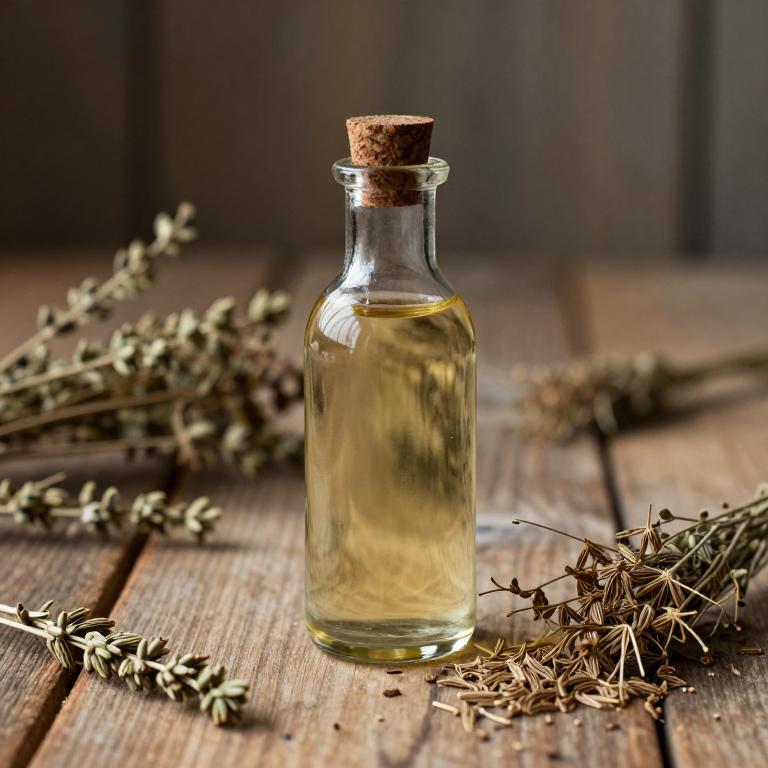10 Best Herbal Syrups For Abdominal Pain

Herbal syrups have gained popularity as natural remedies for alleviating abdominal pain, often containing ingredients like ginger, peppermint, and chamomile, which are known for their soothing and anti-inflammatory properties.
These syrups work by relaxing the gastrointestinal tract, reducing cramping, and easing digestive discomfort. They are typically preferred over pharmaceuticals due to their mild side effect profile and accessibility, making them a suitable option for mild to moderate cases. However, it is important to consult a healthcare provider before use, especially for chronic or severe abdominal pain, to rule out underlying conditions.
Overall, herbal syrups offer a gentle, holistic approach to managing abdominal pain, though their effectiveness can vary depending on the individual and the specific cause of the discomfort.
Table of Contents
- 1. Ginger (Zingiber officinale)
- 2. Black pepper (Piper nigrum)
- 3. Turmeric (Curcuma longa)
- 4. Fennel (Foeniculum vulgare)
- 5. Cumin (Cuminum cyminum)
- 6. Dog rose (Rosa canina)
- 7. Thistle (Silybum marianum)
- 8. Chamomile (Matricaria chamomilla)
- 9. Peppermint (Mentha piperita)
- 10. Stinging nettle (Urtica dioica)
1. Ginger (Zingiber officinale)

Zingiber officinale, commonly known as ginger, has been widely used in traditional medicine for its anti-inflammatory and digestive properties.
Ginger herbal syrups are often prepared by steeping fresh or dried ginger root in sugar and water, creating a soothing and flavorful remedy. These syrups are particularly effective in alleviating abdominal pain caused by indigestion, gas, or nausea due to their ability to reduce inflammation and stimulate digestion. The active compounds in ginger, such as gingerol and shogaol, contribute to its effectiveness in easing gastrointestinal discomfort.
When consumed in moderation, ginger syrup can serve as a natural and accessible option for managing mild to moderate abdominal pain.
2. Black pepper (Piper nigrum)

Piper nigrum, commonly known as black pepper, is often used in herbal syrups to alleviate symptoms of abdominal pain due to its warming and digestive properties.
The active compound, piperine, enhances the absorption of other nutrients and may help reduce inflammation in the gastrointestinal tract. Herbal syrups containing black pepper are typically prepared with honey or other natural sweeteners to improve taste and promote ease of consumption. These syrups are traditionally used in Ayurvedic and homeopathic medicine to relieve bloating, cramping, and discomfort associated with digestive disorders.
However, while they may offer some symptomatic relief, it is important to consult a healthcare professional for persistent or severe abdominal pain.
3. Turmeric (Curcuma longa)

Curcuma longa, commonly known as turmeric, has been traditionally used for its anti-inflammatory and analgesic properties, making it a popular ingredient in herbal syrups for alleviating abdominal pain.
These syrups often combine turmeric with other herbs like ginger, fennel, or peppermint to enhance their soothing effects on the digestive system. The active compound in turmeric, curcumin, helps reduce inflammation and may ease symptoms such as cramping and bloating associated with conditions like irritable bowel syndrome or gastritis. While generally considered safe, it is important to consult a healthcare professional before using these syrups, especially for prolonged periods or in conjunction with other medications.
Overall, curcuma longa herbal syrups offer a natural alternative for managing mild to moderate abdominal discomfort.
4. Fennel (Foeniculum vulgare)

Foeniculum vulgare, commonly known as fennel, has been traditionally used in herbal medicine to alleviate abdominal pain, particularly in cases of colic and digestive discomfort.
Fennel herbal syrups are often prepared by steeping the dried seeds in water or alcohol, then reducing the liquid to create a concentrated syrup. These syrups are valued for their carminative properties, which help to reduce gas and ease cramping in the digestive tract. The active compounds in fennel, such as anethole and fenchone, contribute to its soothing effects on the gastrointestinal system.
While generally considered safe, it is advisable to consult a healthcare professional before using fennel syrup, especially for prolonged or severe abdominal pain.
5. Cumin (Cuminum cyminum)

Cuminum cyminum, commonly known as cumin, has been traditionally used in herbal medicine for its digestive benefits, including the alleviation of abdominal pain.
Cumin herbal syrups are often prepared by extracting the essential oils and active compounds from cumin seeds, which are known to possess carminative, antispasmodic, and anti-inflammatory properties. These syrups can help relieve symptoms such as bloating, gas, and cramping by promoting healthy digestion and reducing gastrointestinal discomfort. When taken as directed, cumin syrups may offer a natural alternative for individuals seeking relief from mild to moderate abdominal pain.
However, it is important to consult a healthcare professional before using cumin syrups, especially for prolonged use or in combination with other medications.
6. Dog rose (Rosa canina)

Rosa canina, commonly known as rosehip, has been traditionally used in herbal medicine for its anti-inflammatory and digestive benefits.
Rosa canina herbal syrups are often formulated with other digestive herbs to support gastrointestinal health and alleviate symptoms of abdominal pain. These syrups may help reduce inflammation in the digestive tract and promote healthy digestion by supporting the production of digestive enzymes. They are typically made from dried rosehips that are rich in vitamin C, antioxidants, and essential fatty acids.
While generally considered safe, it is advisable to consult a healthcare professional before using rosa canina syrup, especially for chronic or severe abdominal pain.
7. Thistle (Silybum marianum)

Silybum marianum, commonly known as milk thistle, is a herbal remedy that has been traditionally used for its potential liver-protective properties.
While primarily studied for its effects on liver health, some anecdotal and preliminary research suggests that silybum marianum herbal syrups may offer relief for abdominal pain, particularly when the discomfort is related to digestive or liver-related issues. The active compound, silymarin, is believed to possess anti-inflammatory and antioxidant properties that may help reduce inflammation in the gastrointestinal tract. However, it is important to note that scientific evidence supporting its efficacy for abdominal pain is limited, and more research is needed to confirm these benefits.
As with any herbal supplement, it should be used under the guidance of a healthcare professional, especially for individuals with pre-existing medical conditions or those taking other medications.
8. Chamomile (Matricaria chamomilla)

Matricaria chamomilla, commonly known as chamomile, is a popular herbal remedy often used in the form of syrup to alleviate symptoms of abdominal pain.
The active compounds in chamomile, such as bisabolol and flavonoids, possess anti-inflammatory and antispasmodic properties that can help reduce intestinal cramping and discomfort. Chamomile syrup is typically taken orally, with a recommended dosage of 2 to 3 tablespoons up to three times daily, depending on the severity of the pain. It is especially effective for conditions like colic, indigestion, and mild gastrointestinal upset.
However, it is important to consult a healthcare professional before use, especially for individuals with allergies or those taking other medications.
9. Peppermint (Mentha piperita)

Mentha piperita, commonly known as peppermint, is often used in herbal syrups to alleviate symptoms of abdominal pain.
These syrups contain essential oils derived from fresh peppermint leaves, which have antispasmodic properties that help relax the muscles of the gastrointestinal tract. The cooling effect of peppermint can also soothe irritation and reduce bloating, making it beneficial for conditions like irritable bowel syndrome (IBS) and indigestion. When taken as a syrup, mentha piperita is easily absorbed and can provide rapid relief from cramping and discomfort.
However, it is important to consult a healthcare provider before use, especially for individuals with certain medical conditions or those taking other medications.
10. Stinging nettle (Urtica dioica)

Urtica dioica, commonly known as stinging nettle, has been traditionally used in herbal medicine for its potential health benefits, including relief from abdominal pain.
When prepared as a herbal syrup, Urtica dioica may help reduce inflammation and soothe digestive discomfort due to its rich content of minerals and antioxidants. The syrup is typically made by simmering fresh or dried nettle leaves with honey or another natural sweetener, enhancing its palatability. Some studies suggest that the compounds in stinging nettle may support gastrointestinal health by promoting healthy digestion and reducing spasms.
However, it is important to consult with a healthcare professional before using Urtica dioica syrup, especially for individuals with existing medical conditions or those taking other medications.